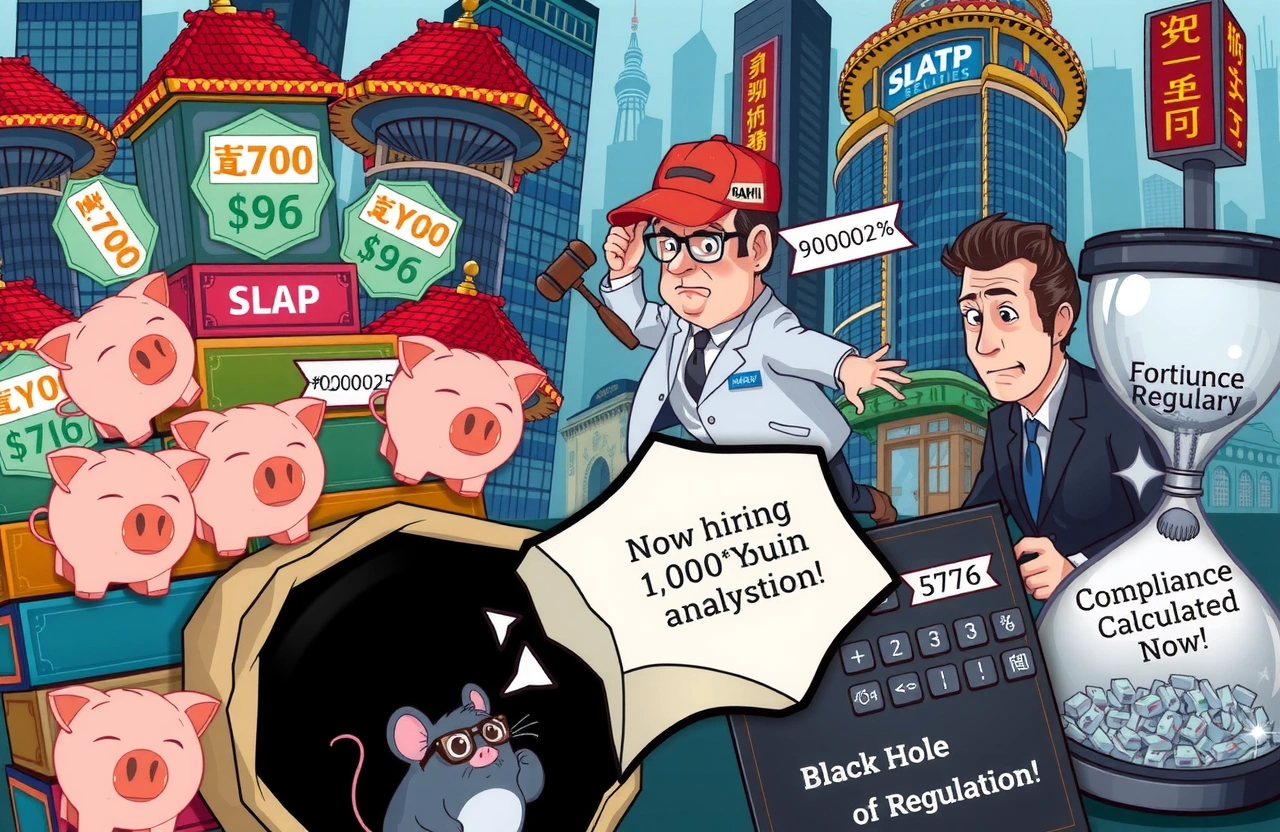Shockwaves Through China’s Bond Market
China’s National Association of Financial Market Institutional Investors (NAFMII) has launched a self-discipline investigation into six major securities firms following their eyebrow-raising bids to underwrite Guangfa Bank’s bonds for rock-bottom fees. In a deal that’s sent shockwaves through the financial industry, brokerages including CITIC Securities (中信证券) and China Galaxy Securities (中国银河证券) agreed to total fees of just 63,448 yuan ($8,700) for handling mid-tier capital bonds – with individual fees dipping as low as 700 yuan ($96) per institution.
Key Developments
– Six top brokerages accepted fees averaging $1,200 each for major bond underwriting
– Regulatory investigation launched within weeks of new anti-low-fee rules announcement
– Underwriting fees plummeted to 0.0002% of Guangfa Bank’s typical bond issuance volume
– Several firms charged less than hourly consulting rates for year-long contracts
The Pricing Breakdown That Raised Eyebrows
On July 10, Guangfa Bank announced winning bidders for its 2025-2026 tier-2 capital bond underwriting contract through its supplier platform. The results revealed unprecedented fee levels that appeared detached from market realities. Each winning institution agreed to provide year-long bond underwriting services for fees that wouldn’t cover typical analyst overtime pay.
Institution-Specific Fee Analysis
– China Galaxy Securities (中国银河证券) and Industrial Bank (兴业银行): 700 yuan ($96) each
– GF Securities (广发证券): 1,050 yuan ($144)
– Guotai Haitong Securities (国泰海通证券): 4,998 yuan ($686)
– CITIC Securities (中信证券): 21,000 yuan ($2,880)
– CITIC Construction Securities (中信建投证券): 35,000 yuan ($4,800)
Regulatory Response to Fee Collapse
NAFMII urgently launched self-discipline investigations into the six brokerages on July 11. This swift action occurred just three weeks after imposing explicit bans against predatory pricing in its June 16 notice. According to market insiders, regulator concerns center on whether such miniscule fees could cover compliance costs or meet professional service standards.
Three Critical Regulatory Violations Suspected
1. Suspected “below-cost pricing” prohibited by Article 3 of Notice #114
2. Potential distortions to price discovery mechanisms
3. Concerns about cut-rate pricing being compensated through side agreements
Broader Industry Context
The alarming fee decline reflects extreme pressure across China’s investment banking industry. With initial public offerings slowing since 2023, brokerages have flooded into bond markets, triggering aggressive fee wars. Market concentration favors top players – the six investigated firms collectively hold 55% market share – yet even leaders engage in destructive competition according to analyst reports.
Bond Market Dynamics Explained
The bond underwriting market has experienced dramatic shifts:
| Year | Total Bonds Underwritten | Total Value | YoY Growth |
|---|---|---|---|
| 2024 | 24,844 | 8.04 trillion yuan | 21% |
| 2023 | 18,730 | 6.65 trillion yuan | – |
The volume surge hasn’t compensated for margin compression. Top-10 firms captured nearly 80% market share during Q2 – creating conditions where giants compete primarily through fee discounting rather than value-added services.
Potential Market Implications
Banking professionals warn that unsustainable fees eventually compromise service quality and risk management. “When firms charge less than document-binding expenses, they inevitably cut corners,” commented a bond operations director at state-owned ICBC. The practice potentially creates systemic vulnerabilities – especially for capital instruments like tier-2 bonds that provide crucial financial system buffers.
Three Probable Outcomes:
– Regulatory suspensions for most aggressive pricing firms
– Formal sanctions setting fee percentage minimums
– Mandatory project profitability assessments
The Path Forward
Beyond regulatory actions, industry participants must fundamentally revalue financial services. Brokerages compete in a complex ecosystem where service expertise deserves appropriate valuation beyond checkbox-ticking exercises. Banks issuing bonds should prioritize capability over cost savings – particularly for sophisticated instruments requiring nuanced risk management.
Institutional investors tracking bond issuance quality should scrutinize this incident. Fee structures revealing inadequate resource allocation could signal higher fraud risks or weaker post-issuance monitoring. Submit formal inquiries to issuers regarding auditor verification of adequate underwriting resource allocation.
The investigation timeline suggests preliminary findings emerge mid-August. Market participants should prepare for these potential scenarios: revocation of licenses for egregious offenders, minimum fee guidelines, or mandatory profitability declarations on services contracts. Brokerages exceeding integrity thresholds deserve investor recognition for sustainable business models.
The financial industry stands at a crossroads: pursue destructive price wars or collectively rebuild service valuation. Institutions championing professional standards should publicly commit to sensible pricing frameworks – your initiative preserves financial ecosystem integrity.



